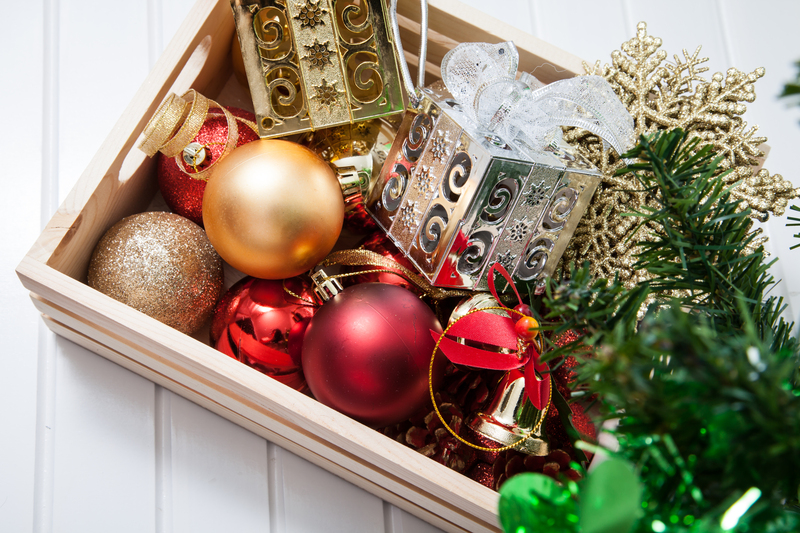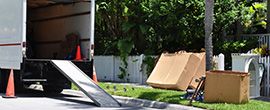Smart Moving Strategy: Start with Decluttering
Posted on 07/06/2025
Smart Moving Strategy: Start with Decluttering
Planning a move is both exciting and stressful, whether you're relocating across town or to a new city. The sheer amount of packing, organizing, and transporting belongings can be overwhelming. However, seasoned movers and organizational experts agree on a crucial secret: a smarter way to move starts with effective decluttering. In this comprehensive guide, you'll learn how decluttering before moving not only simplifies the packing process but also saves time, money, and effort. If you're looking for a smart moving strategy that ensures a smooth relocation, decluttering is your essential first step.
Why Decluttering Is the Foundation of Every Smart Move
Before we dive into practical decluttering steps, let's explore why decluttering is an invaluable component of a flawless moving plan.
- Less to Pack: Reducing your possessions means packing is quicker and less exhausting.
- Lower Moving Costs: Moving companies often charge by weight or volume--fewer items equal lower fees.
- Easier Unpacking: A decluttered home translates to a fresh start, free from unwanted clutter at your new residence.
- Emotional Relief: Letting go of unused or unnecessary items can feel liberating and reduce moving anxiety.
- Opportunity to Donate or Sell: Decluttering gives you a chance to help others or earn extra cash by selling possessions you no longer need.
Smart moving strategies universally emphasize the importance of beginning with decluttering to streamline every next step.

Step-by-Step Guide: Decluttering Before You Move
Embarking on a full-home declutter may seem daunting, but with a strategic approach, it becomes manageable--and even enjoyable! Below is a breakdown of the ideal moving declutter strategy.
1. Start Early and Create a Decluttering Timeline
Procrastination is the enemy of a smooth move. Begin decluttering as soon as you know you'll be relocating. Break the process into manageable tasks and assign deadlines for each room or major category. This ensures you won't be rushed at the last minute.
- Recommended Start Date: 6-8 weeks before your moving day
- Divide your home by zones or rooms to create a clear schedule
- Allocate extra time for rooms with high accumulation (attic, garage, storage closets, etc.)
2. Gather Supplies for Sorting
You'll need a few basic supplies for an efficient decluttering process:
- Sorting bins or bags (for keeping, donating, selling, recycling, or trash)
- Labels or sticky notes to mark grouped items as you go
- Cleaning supplies for wiping down empty spaces
- Permanent markers to clearly identify boxes or piles
3. Use the "Four-Box Decluttering" Method
This classic technique keeps you organized as you work through each room. Label four boxes or prep piles as follows:
- Keep: Items you truly need, use regularly, or deeply cherish
- Donate: Items in good condition you no longer need
- Sell: Items of value that you're willing to spend time listing online or selling locally
- Trash/Recycle: Anything broken, expired, or not suitable for donation
4. Ask the Tough Questions for Each Item
- Have I used this in the past year?
- Would I buy this again today?
- Do I have duplicates?
- Does this item hold significant sentimental value?
- Is it worth the cost and effort to move this?
Be honest and realistic--each item you keep adds to your moving workload.
5. Declutter Room by Room
A room-by-room approach is the smartest decluttering strategy. Focus on one area at a time to avoid becoming overwhelmed. Here's a typical order:
- Storage areas (attics, basements, garages): These accumulate clutter and are rarely used.
- Bedrooms and closets: Pare down clothing, shoes, accessories, and decor.
- Living room: Address books, magazines, DVDs, electronics, games, and furniture.
- Kitchen: Sort through utensils, dishes, pantry items, appliances, and Tupperware.
- Bathrooms: Dispose of expired products, old linens, rarely used gadgets, and duplicates.
- Home office and paperwork: Shred unnecessary documents, and recycle what you no longer need.
6. Handle Sentimental Items Last
It's common to get stuck when it comes to sentimental belongings. Leave these for last so momentum carries you through the tough decisions. When you approach these, set aside extra time and consider creative ways to preserve memories--digitizing photos, consolidating keepsakes, or gifting items to family members.
7. Sell, Donate, Recycle, or Junk Responsibly
Once you've sorted everything, take immediate action to prevent second-guessing. Here are some smart moving tips for disposal:
- Donate: Arrange donation pickups or drop-offs to nonprofits.
- Sell: Use online marketplaces like Facebook Marketplace, Craigslist, or local consignment stores for valuable items.
- Recycle and Trash: Look up local recycling guidelines for electronics, hazardous waste, or bulk trash collection.
How Decluttering Amplifies Every Other Moving Strategy
Integrating decluttering into your smart moving plan has a domino effect on the entire relocation process. Here's how:
1. Streamlined Packing
With fewer belongings, you'll pack faster and use fewer boxes and supplies. Your labeled packs will be more organized, knowing everything inside deserves its place.
2. More Accurate Moving Quotes
Since most moving companies base estimates on weight or volume, decluttering helps you get an accurate quote--no surprise fees or last-minute changes due to unanticipated extra items.
3. Lower Moving and Storage Costs
The less you move, the less you pay. If you need temporary storage, fewer items mean smaller units and shorter rental periods, saving you money in the long run.
4. Reduced Physical and Emotional Strain
Physical moving is demanding, but walking into a decluttered new home is uplifting and serene, reducing stress on the moving day and beyond.
Top Mistakes to Avoid When Decluttering for a Move
- Waiting until Packing Day: Rushed decisions lead to keeping unnecessary items or making hasty donations you might regret.
- Attempting Everything Alone: Get family, friends, or even professional organizers involved for accountability.
- Hanging Onto "Just-In-Case" Items: If you haven't used it in a year, you probably don't need it.
- Neglecting to Dispose Responsibly: Overlooking recycling or proper disposal can be wasteful or even illegal in some municipalities.
- Underestimating Sentimental Attachments: Acknowledge the emotions involved and give yourself grace as you make decisions.
Expert Tips for Decluttering Like a Pro
- Set a Decluttering Playlist: Upbeat music or an engaging podcast can keep energy levels high.
- Reward Yourself: Celebrate when you finish a room, even with a small treat or break. Motivation matters!
- Visualize Your New Space: Imagine your future home free from clutter. This vision can make letting go easier.
- Snap Before-and-After Photos: Satisfaction can grow from seeing your progress tangibly.
- Adopt a 20/20 Rule: If something can be replaced for $20 or less in under 20 minutes, consider letting it go.
- Stay Committed to the Process: Decluttering is a marathon, not a sprint, especially before a big move.

Frequently Asked Questions: Decluttering for a Smart Move
Q1: When should I start decluttering before a move?
Begin as early as possible, ideally 6-8 weeks before your planned moving date. This allows for a methodical, stress-free process.
Q2: What if I have a tight moving schedule?
Prioritize high-clutter zones first (like storage areas), and focus on donating or junking large items you're sure you don't want. Use evenings or weekends for quick decluttering sprints.
Q3: How do I decide what items to keep?
Use the one-year rule: if you haven't used, worn, or needed it in the past year, you can likely let it go. Exceptions can be made for certain seasonal or sentimental items, but be rigorous.
Q4: Should I hire professionals to help?
If you're overwhelmed by the process, consider hiring decluttering specialists or moving consultants. They can accelerate the process and provide objective guidance.
Q5: Is it possible to declutter too much?
While minimalism is popular, avoid going so far that you discard essentials or items of true value. Review categorized items before final disposal to make sure you're comfortable with your choices.
Final Thoughts: Make Decluttering the Cornerstone of Your Smart Moving Plan
A successful, stress-free move is built on the foundation of thoughtful decluttering. It's much more than simply throwing things away--it's a chance to reset, refresh, and embrace your next chapter unburdened by excess.
- Start early to avoid last-minute stress
- Sort items methodically and decisively
- Dispose responsibly by donating, selling, recycling, or trashing items
- Visualize the clean, organized space awaiting you
Decluttering before a move is the smartest moving strategy you can adopt. Make it your first step, and watch the rest of your moving process become simpler, more efficient, and even enjoyable. Your future self will thank you!






